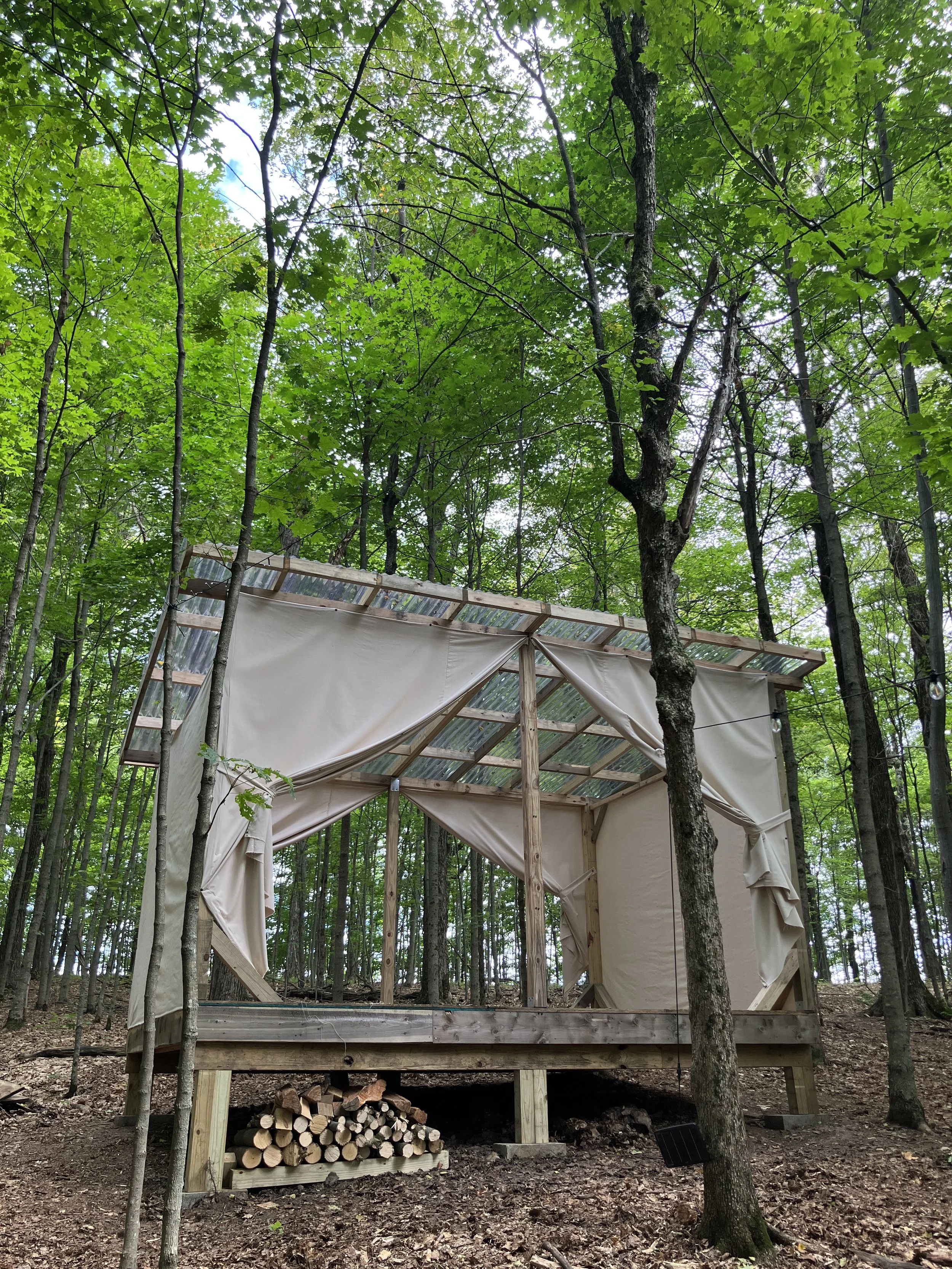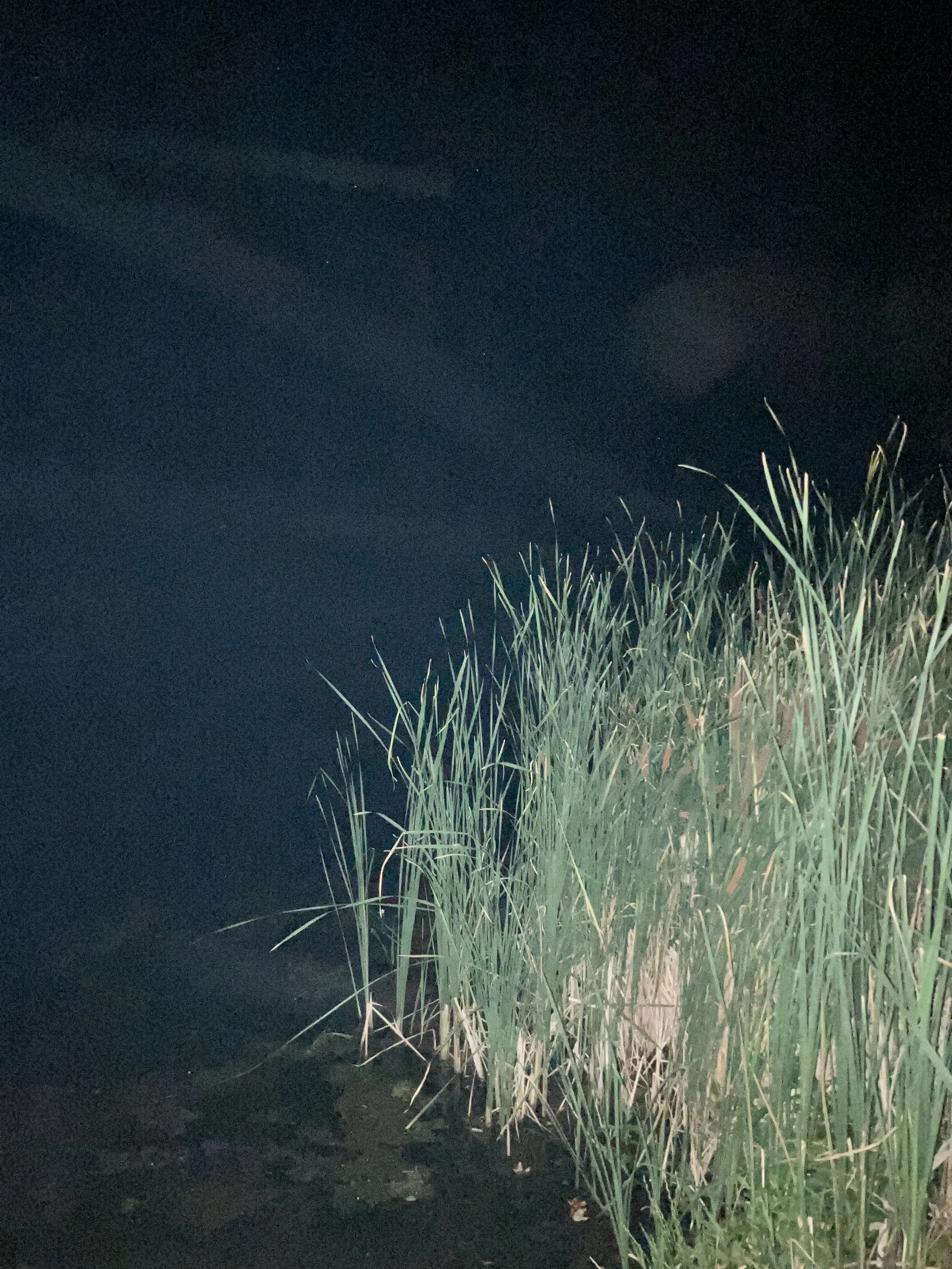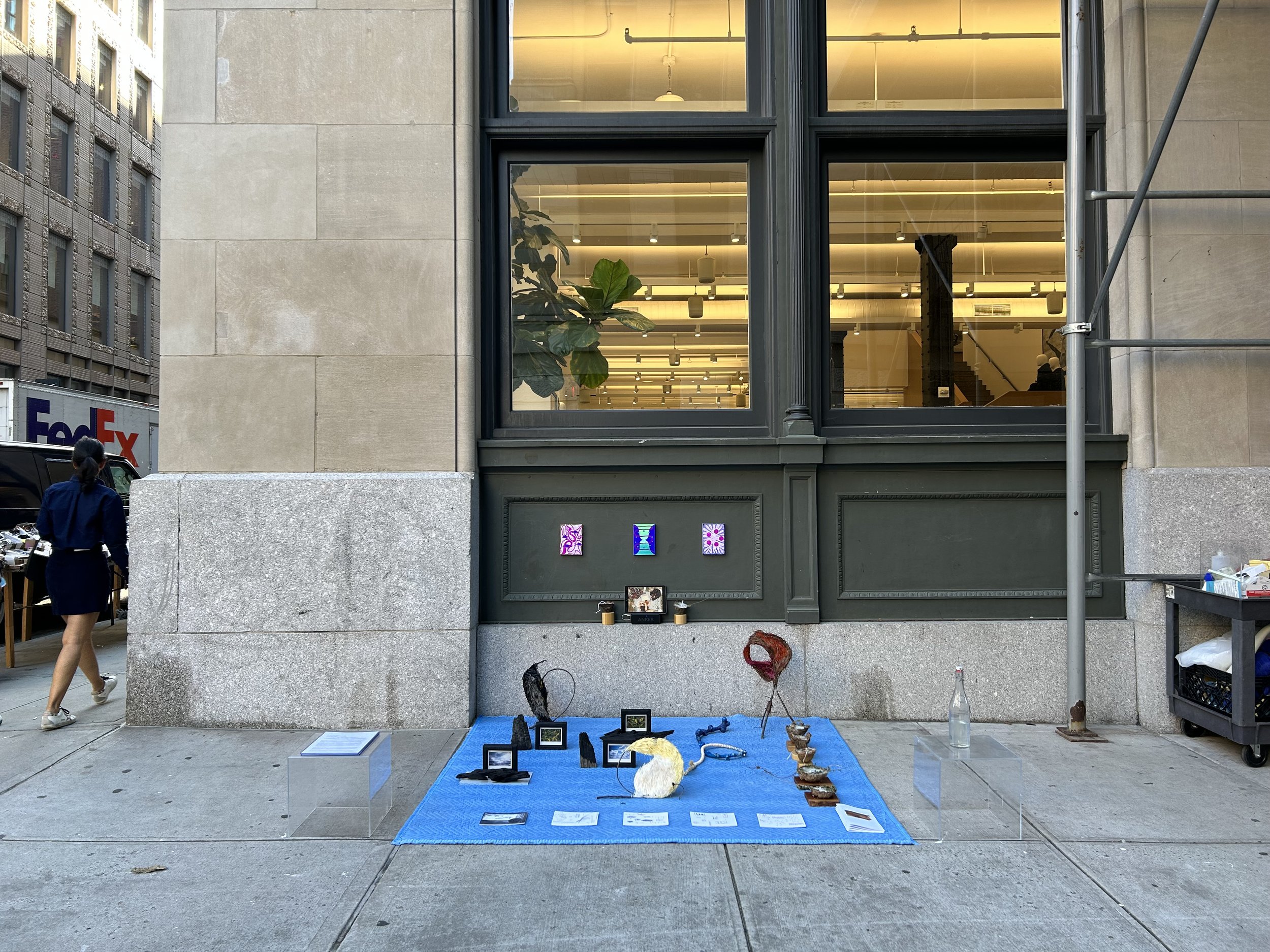Beatrice Modisett and Kerri Ammirata | P.A.D.
Beatrice Modisett, The Skin of Our Terrain IV, 2023 Instax Wide in charred artist-built frame with a found and charred piece of downed tree from Summit, NY on aluminum Variable dimensions
More Trees Than People!!
Beatrice Modisett and Kerri Ammirata
P.A.D.
October 28, 9am-7pm 2023Introduction
Under the trees, ten fingernails dug and scraped at the dirt, moving just enough material to create an indent the size of two hands cupped together. A wax cast was made and the dirt was returned. Up the hill in a grassy clearing, four hands collected hundreds of fallen acorns one by one, while many more continued to fall around them. These acorns and the great potential they hold collided with the spruce wood of a 100 year old violin and a sonic celebration filled our ears. The acorns were returned. In a meadow surrounded by mountains, two hands wrapped grass around a twig and paper structure, two hands rested in a lap, one hand held a paintbrush, the breeze halted and then returned.
A campfire was always burning.
In August of 2023, artists Kerri Ammirata and Beatrice Modisett invited five city-based visual artists and musicians to spend three days sleeping, cooking, showering, resting and otherwise living outside together in the woods of Summit, NY, a small mountain top community located between the Catskill and Adirondack mountains of Upstate New York. Artists were invited to create site responsive work for an upcoming exhibition with P.A.D. (Project Art Distribution), a nomadic, outdoor exhibition space in SoHo, NYC. With our physical conditions upended cognitive shifts soon followed. The work created during these three days presented seven different takes on a single place most of the artists had never been to, yet formed a deep relationship with. The idiosyncrasies of each work, and each artist’s approach, highlighted the generosity of non-humancentric landscapes as places that make space for novel ideas and ways of creation.
Once back in our familiar working conditions, we metabolized our profound experience with this place and with each other into the objects presented in the outdoor group exhibition, More Trees Than People!!. When transported to P.A.D. these images and objects created a space to consider the poetics of the woods and the politics of SoHo, and served as portals to a place where there are many more trees than people.
The seven participating artists and musicians were Natessa Amin, Kerri Ammirata, Beatrice Modisett, Charlotte Munn-Wood, Aimée Niemann, s.arinade, and Christine Stiver
More Trees Than People!! Statement
Co-organized by Kerri Ammirata and Beatrice Modisett, the residency More Trees Than People!! took place on 26 acres of woods and meadow in Summit, NY. Surrounded by farmland and lakes the property presents myriad opportunities for both solitude and intentional community building. As the current caretakers, artist Beatrice Modisett and percussionist Ellery Trafford are hand-building environmentally friendly dwellings for artists, musicians, and writers to enjoy this space with minimal impact. Despite human presence, the property continues to be a haven for wildlife. Every decision made on the property centers on reciprocity, gratitude, equity, and sustainability and we welcome artists and makers with similar ethics to the property.
Kerri Ammirata utilizes painting to explore themes of sacred geometry, astronomy, and landscape. Through idiosyncratic and invented techniques that are both aggressive and meditative her paintings dissolve boundaries and disintegrate shapes into hypnotic, rhythmic marks.
Beatrice Modisett is a visual artist working primarily with found and handmade materials with a focus on the creation of meaning through process, material, and image. Through the lens of her deep connection with non-humancentric landscapes, Modisett’s images and objects explore themes of memory, loss, return, hope, creation, and destruction.
Ellery Trafford is a percussionist and founding member of TAK Ensemble, a new music ensemble dedicated to presenting experimental music by living composers and founded on the principles of curiosity, change, and caring communication.
P.A.D. Statement
P.A.D. is a nomadic outdoor art exhibition space in the historic SoHo (South of Houston) Arts District in New York City. It reflects the bustling economy of artists making, selling, and promoting their artworks on the street year-round, weather permitting. The space aims to platform small and editioned works by artists who are interested in embracing new contexts for exhibiting.
Approach/methodology
While some impacts were calculable we also chose to focus on the intangible and incalculable/infinite impacts the project had on participants. The spaces that upheld this project, both the property in Summit, NY and P.A.D were founded on principles that center on environmentally friendly practices. For the purpose of this Climate Impact Report, we researched nine areas that we identified as having the most impact on both the participants and the environment: Travel, Ceremony, Dwelling, Fire, Meals, Energy, Light, Water, and Waste.
Putting this report together highlighted areas where calculable emissions could be further tempered in future iterations and also areas where incalculable positive impact could be heightened. This includes the creation of more opportunities to discuss the environmentally aware decisions that are being made at every step of the project and including participants in these conversations which were centered by the organizers. We have included these nine areas of research below in descending order of most impact to least. This report will further outline the impacts in each of these areas.
-
Travel to property:
Three cars to and from the city
2006 Toyota Corolla
Traveled to/from Ridgewood NY
Footprint = 0.10 tC02e2021 Volkswagen Atlas
Traveled to/from Ridgewood NY
Footprint = 0.14 tC02e2022 Bronco Sport (non-hybrid)
Traveled to/from Philadelphia, PA
Footprint = 0.16 tC02e1 trip to the pond for stargazing and recording frog mating calls
7 artists and musicians
2.4 miles roundtrip in 2021 Volkswagen Atlas
Footprint = 0.001 tC02eTravel to and from the opening for artwork and artists
Transporting organizers and artwork from Ridgewood,Queens to SoHo, NY:
12.1 miles in a 2006 Toyota Corolla released 0.01 tC02eExhibiting artist traveling to and from Philadelphia via car for the opening in a 2021 Volkswagon Atlas released 0.08 tC02e
Exhibiting artist traveling to and from Philadelphia via train for the opening released 0.01 tC02e
-
3 poems read aloud at the beginning of each dinner
Beginning each meal with non-humancentric poetry readings framed the meal as a space to discuss the environment and our place within it.Ode to Dirt by Sharon Olds, pg 311 of All We Can Save by Ayana Elizabeth Johnson and Katharine K. Wilkinson
Being Human by Naima Penniman, pgs 266 - 269 of All We Can Save by Ayana Elizabeth Johnson and Katharine K. Wilkinson
I Wandered Lonely as a Cloud by William Wadsworth
1 artist singing a dismantled version of Ella Fitzgerald and Louis Armstrong’s “Dream a Little Dream of Me”
Experimental violin duo Du.0 performing SOUNDnest
-
The dwellings are temporary structures that can be moved and repurposed. They are wooden structures with canvas walls and clear roofs which allow for the deep immersion in the place even while sleeping. They were handbuilt with the intent to create the thinnest membrane possible between occupant and environment.
PACKING LIST
Sleeping bag or sheets/blankets
Pillow
Air mattress or sleeping pad (we have solar power for the air mattress pumps)
Natural insect repellent
Biodegradable sunscreen
Boots or sneakers (you will wear these for the most part)
Flip flops or slip on shoes (for late night bathroom runs or hammock time)
Water bottle
Morning beverage mug
Flashlight or lantern
Swimsuit (optional)
Swim shoes (optional)
Supplies you need for your work
Toiletries
Eyemask (optional, but all the cabins/tents will be very bright in the morning)
Clothes (optional)
Rain gear (weather dependent)
Something to share with the group (ideas, food, games, media, etc)Optional:
Your preferred tea or coffee
Alcohol
Snacks
Cash for farm stands
Extra toiletries - if you bring your own soap, shampoo, toothpaste etc. please make sure it is biodegradableWe provide:
Tents/cabins
Drinking water and coffee/tea
Breakfast, lunch and dinner (We will need help with clean up and dishes)
Biodegradable bathroom and shower supplies (The soap is Dr. Bronners Lavender and Eucalyptus)*Cell Phone service (including internet with cellular data) for most carriers is reliable
-
Daily fires up to three times a day were an important ritual for participants in this project. The labor of collecting wood was an intentional act of reciprocity and a space to practice gratitude for what the place was providing us. The campfires themselves activated our communal space and led to energetic mornings and long conversations deep into the night.
When it comes to campfires, the work to avoid billowing plumes of smoke that disrupt conversation, dictate seating arrangements, sting eyes, and cut evenings short, begins at least a year in advance. In early spring it is imperative, after the last heavy snow has made the final decision as to which trees and branches would have their final standing season, that you find these fallen comrades. Always, there will be more of these downed trees and branches than you can count, so look for a few that are near to where you store your firewood and leave the rest of the collapsed to hold hands with hope, be the whale falls of the forest, to slowly decay into nutritious lines of habitat before eventually dissolving completely into the forest floor, adding to its bedding. The select branches and trees you do choose, the ones that lay close to the place you store your firewood, have a different destination, a fate to fulfill a highly regarded position - the perfectly dried campfire log.
-
Identify which trees and branches are located close to where you store your firewood to cut down on the labor of lugging.
Make sure the trees and branches show no signs of rot, and that they are freshly fallen. Mushy and decaying branches and trees are already en route to their destination and it is not to your campfire.
Once conveniently located and freshly fallen branches and trees have been located, it’s time to sharpen your chainsaw. Also locate your long heavy pants, your work boots, eye protection, ear protection, and work gloves. Note: This whole process is a lot more enjoyable with a battery-powered chainsaw rather than introducing the stench and pollution of a gas-powered one.
Once you're sharpened and suited, cut the tree or branch into manageable-sized logs - about 12 - 14 inches.
Haul these chunks onto a chopping block and get to chopping and mauling. Split the wood chunks into quadrants.
When you’ve got a pile of freshly divided wood, load them into your wheelbarrow and stack them somewhere safe in a way that allows airflow. Little critters will delight in this new habitat.
Wait at least a year before placing your perfectly dried log on top of your freshly lit delicate and powerful bundle of collectively collected dried twigs while someone slices the tomatoes.
Meals : 186.g C02e | Space for collaboration and conversation
The three vegan meals a day which we shared communally nourished our bodies and acted as fertile space to discuss the ideas we had for our practices, the poems we began the meals with, and our individual insights into the place we were discovering together.
-
Cooking a meal on a Eureka SPRK+ Butane campstove purchased with a gift card from REI’s online shop is a very different experience than percolating coffee, flipping pancakes, warming soups, and scrambling tofu over a campfire. Cooking a meal on a Eureka SPRK+ Butane campstove purchased with a gift card from REI’s online shop is a solitary endeavor. One operator is needed to remove the campstove from its plastic carrying case. One operator is needed to flip open the metal lid and properly install the can of butane and the same lone operator is beyond capable of closing the metal lid, locking the metal lid, and - click, click, click, whoosh - turning a black plastic knob to get the meager flame started. There is room for only one to stand before the tabletop gadget and thus, there is little room for more. Not much is inspiring about a Eureka SPRK+ Butane campstove purchased with a gift card from REI’s online shop. To its credit, it efficiently presents the operator with a flame, and this flame is reliably hot. Paradoxically and without fail the operator feels a sense of cold detachment from this flame and by extension what they are making. It’s an efficient little thing, it’ll get the dinner done, and the hungry diners will eventually arrive at the table when the operator calls out. But the little box of plastic and metal is not a place to gather and these beloved diners won’t be overly motivated to leave their hammocks, or their tree house, or their blanket in the meadow, to arrive at the dinner site much sooner than the food is placed on the table.
But cooking over a campfire - A CAMPFIRE - a campfire is a deep and primal call to collaboration. It is what the agoras of our dreams are made of, an activator of space, a champion of fruitful silence, a conversation starter, a shared experience that connects us to our shared ancestors. When cooking over a campfire dinner starts long before the table is set, even before the lettuce is washed. When cooking over a campfire, dinner doesn’t start with a bell, or the pop of a cork. When cooking over a campfire, dinner starts with the call to collect! Bodies will gladly leave their hammocks, their tree houses, their blankets in the meadow to help seek out and gather tiny dried twigs offering their potential to us, the tiny dried twigs that hold the fate of our meal in their thin knotty bodies. To have the beloved and important duty of finding fuel - wandering through the woods, eyes keenly attached to the forest floor searching for that perfect piece of kindling, to rub fingers along a slender column of grey bark, to bend it, to snap it and experience that sharp crack of a perfectly dried branch - this is a deep and important joy, this is a deep and important task. Before the table is even set, diners eagerly arrive to source the fuel for this fire that will in turn fuel us. Who gets the hugely pleasurable honor of lighting our delicate and powerful bundle of collectively collected dried twigs? I’ll slice the tomatoes while you add some wood to our ever growing fire. Have you seen one of those amazing bright orange mushrooms yet? The water was so warm today. I can’t believe I finally saw a ghost flower. I hope the stars are out tonight. Ongoing cracks and pops and the hiss of escaping steam replaces the cold and finite, click, click, click, whoosh - faces have been warmed, conversation has begun, dinner has begun, before the table is even set.
-
1 x jar of organic kalamata olives
1 x bag of organic lemons,
1 x Birch Blenders organic pancake and waffle mix,
1 x Bob’s Red Mill red lentils,
2 x Bob’s Red Mill traditional pearl couscous,
1 x Nature’s Promise tomato paste, 1 x Nature's Promise tomato sauce, Pacific Organic’s low sodium vegetable broth,
2 x organic jumbo carrots,
2 x organic cucumbers, 1 x organic green pepper,
1 x organic parsley bundle,
1 x organic mint bundle, 1 x organic cabbage head,
1 x organic red bell pepper, 1 x organic yellow pepperThese groceries were used to make meals ahead of time that were cooked on a gas stove in Ridgewood, NY
Impact: Emissions from car trip from grocery store to Ridgewood home, emissions from food shipment from source to Ridgewood, wear and tear on a wooden cutting board, gas stove emissions = 0.00186 tC02e
-
two big salads,
Buns x 6 packs,
Balsamic Vinegar,
Veggie burgers,
Firm tofu x 3,
Avocado x 8,
Hummus,
Sprouts,
Mozzarella (big) ,
Grinder rolls,
Potato Chips,
Pickles,
Corn chips,
Salsa,
x 10 Portobello mushroom caps,
Good bread for dipping in oil x 2,
Jiffy pop x 2,
Granola bars,
ICE,
Oat milk,
Espresso / Tea,
Toilet Paper,
Dish Sponges,
Tom’s toothpasteThese groceries were either consumed raw or cooked over a campfire
Impact: Emissions from car trip to and from Price Chopper, emissions from food shipment from source to Cobleskill, carbon released during campfire
-
big salads x 2 nights (tomato, radish, cucumber, etc),
fresh fruit for pancakes,
maple syrup,
cucumber for mediterranean salad,
cherry tomatoes for mediterranean salad,
10 big tomatoes for sandwiches and veggie burgers,
lettuce for topping veggie burgers,
parsley for mediterranean salad,
mint for mediterranean salad,
lemon for mediterranean salad,
veggies for tofu scramble (kale etc),
veggies for kabobs (onions, mushrooms, eggplant),
big bag of apples for snacks,
12 ears of cornThese groceries were consumed raw or cooked over a campfire
Impact: Emissions from car trip to and from the farm stand, supporting local farmers and the Amish community, interacting with other neighbors buying their groceries, enjoying the hand painted signs advertising fresh flowers and fresh fudge and local maple syrup.
-
Breakfast served at 7am / Lunch starts at noon / Dinner and campfire served at 7pm prep starts at 6!
Friday August 18th
Dinner: Ridgewood red lentil sloppy joes ** reheated on a campfire on buns with fresh veggie salad with oil and vinegar dressing.
Saturday August 19th
Breakfast: Pancakes with fresh fruit and maple syrup, seitan breakfast sausage, coffee and tea
Notes: Batch pancake batter in Ridgewood*** pancakes can be cooked in the flat cast iron on the little campstove and sausage/coffee on campfire. Kerri makes pancakes while Beatrice does fire stuff or vice versa.
Lunch: Cold pearl couscous salad and side of bread and olive oil.
Notes: Kerri will make plain pearled couscous in Ridgewood*** and we will both add farmstand veggies day of in big stainless steel bowl
Dinner: Chips and salsa, Veggie burgers with buns and toppings, big fresh farmstand salad, corn on the cob
Sunday August 20th
Breakfast: Tofu scramble with sauteed farm stand veggies on the side (kale, peppers, mushrooms and tomatoes?) with pickled onions.
Note: Tofu can be cooked on the camp stove and veggies sauteed and coffee made on campfire. Make pickled onions in Ridgewood.
Lunch: Self assembled cold sandwiches. Avocado, hummus, sprouts, tomato, mozzarella, olive oil, salt and pepper with potato chips and pickles
Dinner: Grilled portobello mushroom burgers with avocado, lettuce, tomato on top, vegetable kabobs, bread and olive oil and popcorn for movie night
Monday August 21
Breakfast: Apples, assortment of granola bars, coffee and tea
Always available for self-serve:
Water
Bialetti for coffee
Big bowl of local apples
Oat milk
Make ahead of time in Ridgewood
Kerri making: Pancake batter, pearl couscous, red lentil sloppy joes
Beatrice making: pickled onions
Bring from home Kitchen
Cast iron pans and dutch oven, Bialetti, Cloth Napkins, Salad serving tongs
-
Our energy use created a space in which to discuss the ease and dependability of solar power. Many participants had never utilized solar for personal use so we were able to give demonstrations on how solar panels helped power our experience.
Number of estimated hours spent preparing for the residency and exhibition 37.5 hours (average 1.5 hours over 25 weeks) x 2 = 75 hours = 2250 watts of grid electricity
Number of estimated hours spent preparing this Climate Impact Report = 30 hours (including meetings with mentor Deville Cohen and hours spent compiling images and data into this report) = 900 watts of grid electricity
On the residency we drained our solar power station, the Renogy Power Station 200, two times total for charging laptops, cell phones and water pumps.
Solar energy was used to pump water through six feet of tubing from a 10 gallon water tank to the outdoor shower head.
-
Forty gallons of water were used over the course of the three day residency for showering.
Roughly 0.25 gallons of propane were used to heat the forty gallons of water
Roughly twelve gallons of water were used to wash hands, wash faces, and brush teeth. This water was not heated and operated in a gravity fed sink.
Roughly 30 gallons of rainwater heated over a campfire were used to wash dishes over the course of the three day residency.
-
Reuse
Multiple milk crates
Bubble wrap
Cardboard box
Moving blankets
Heavy plastic used for wrapping artwork
Return
Branches,
sticks, leaves, and acorns that were used to create the Soundnest installation were returned to the park they were borrowed from
Recycled
Leftover printed exhibition checklists
Landfill
Packing tape used to wrap artwork
The exhibition at P.A.D.
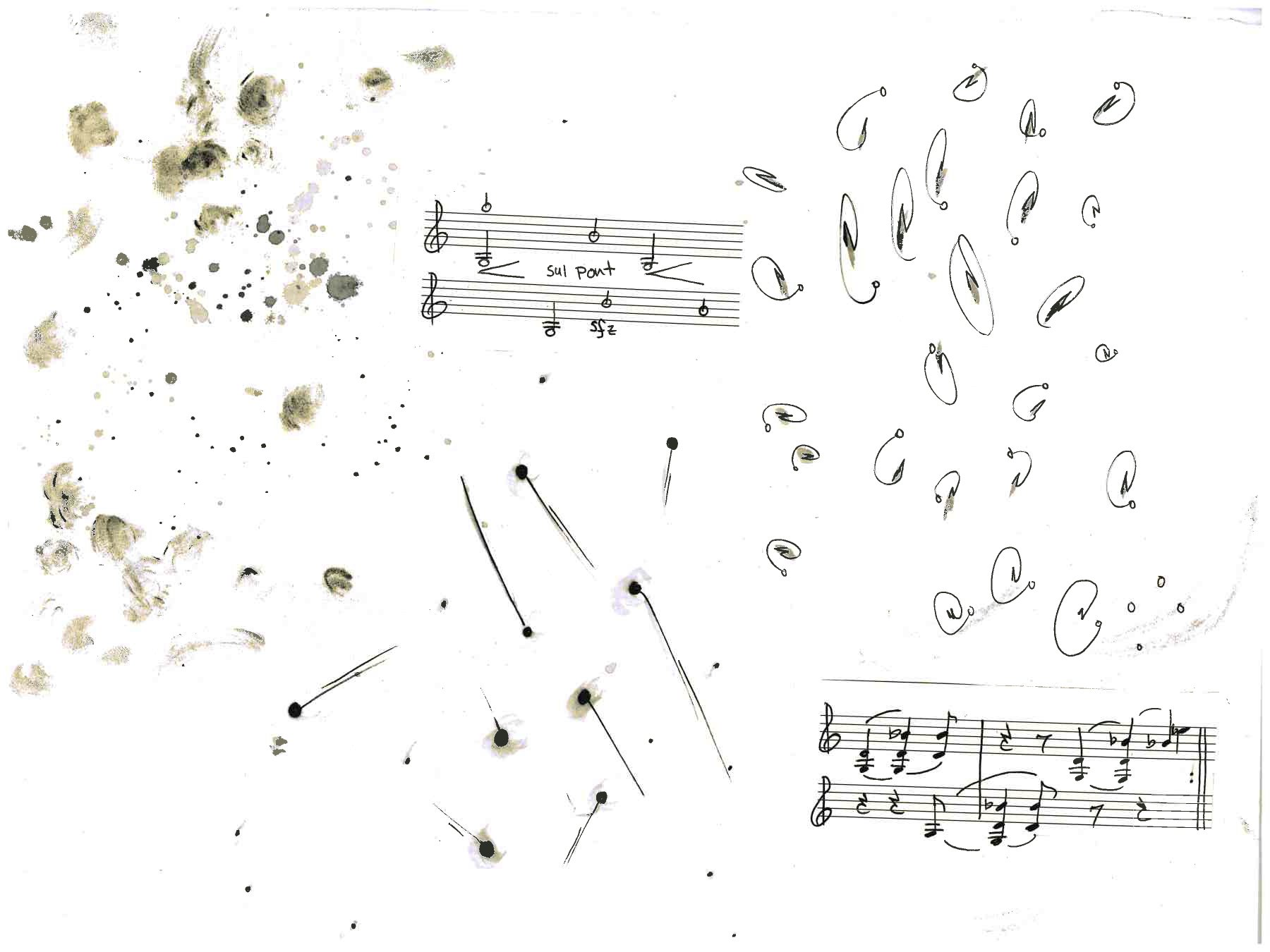
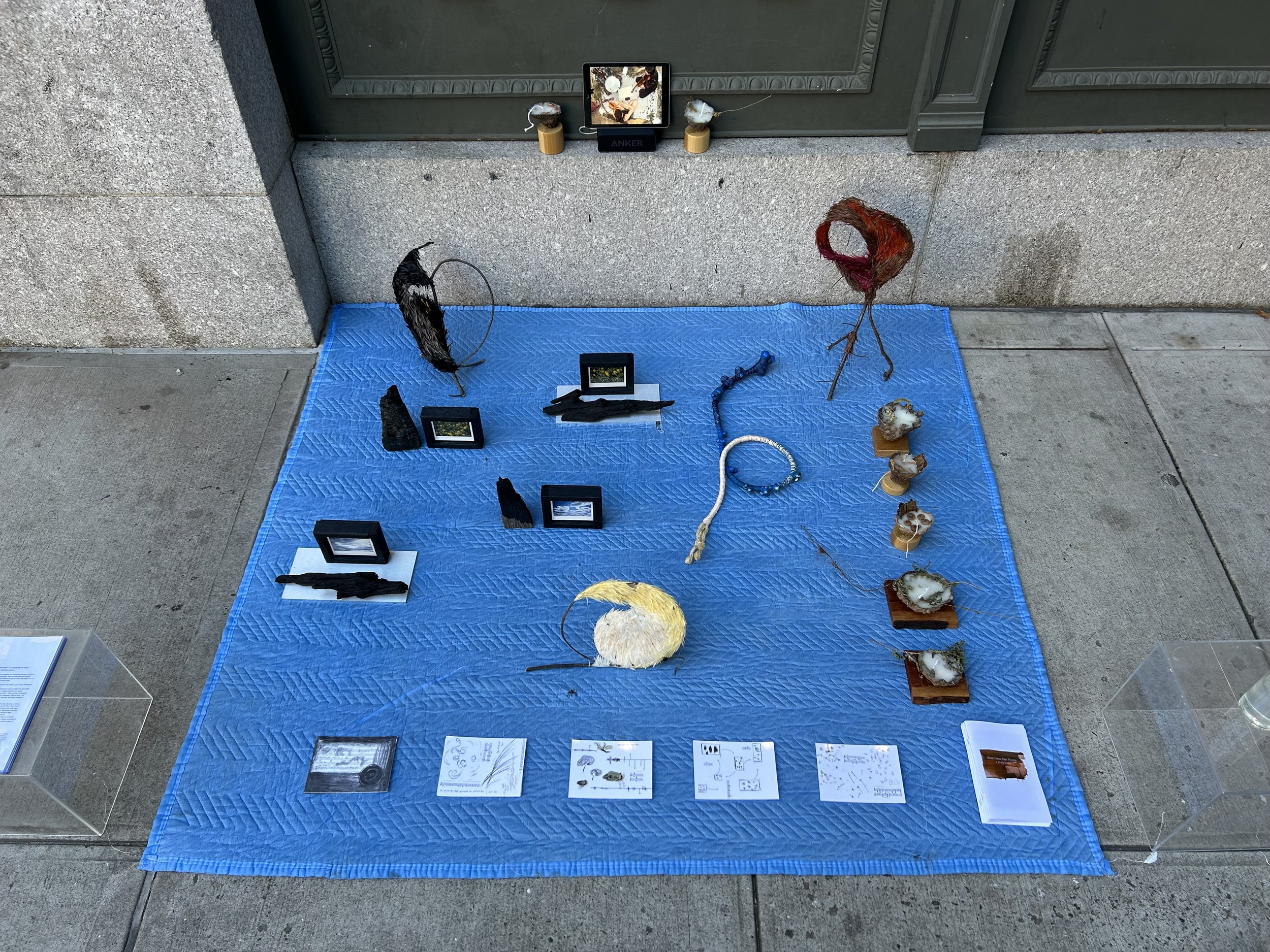
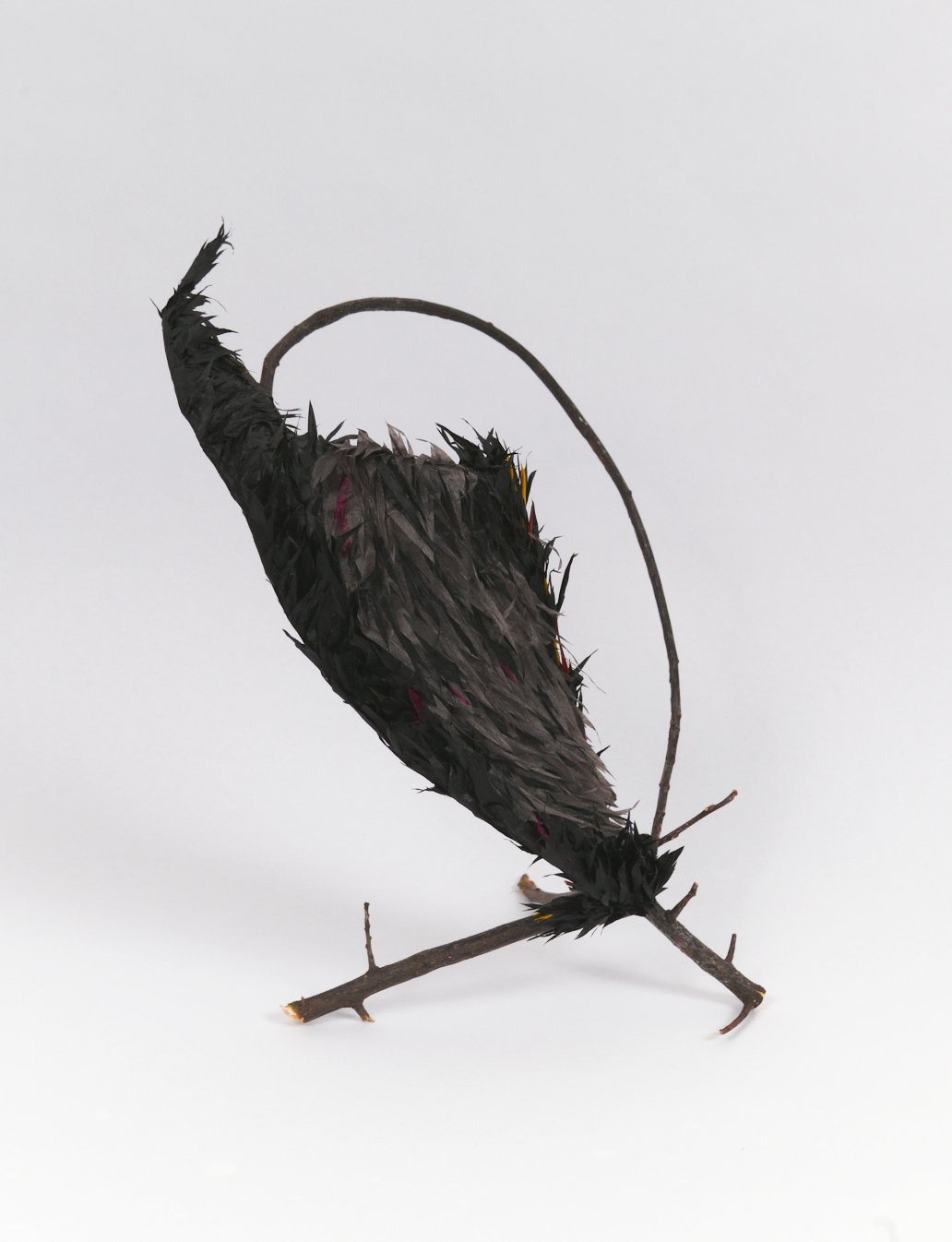
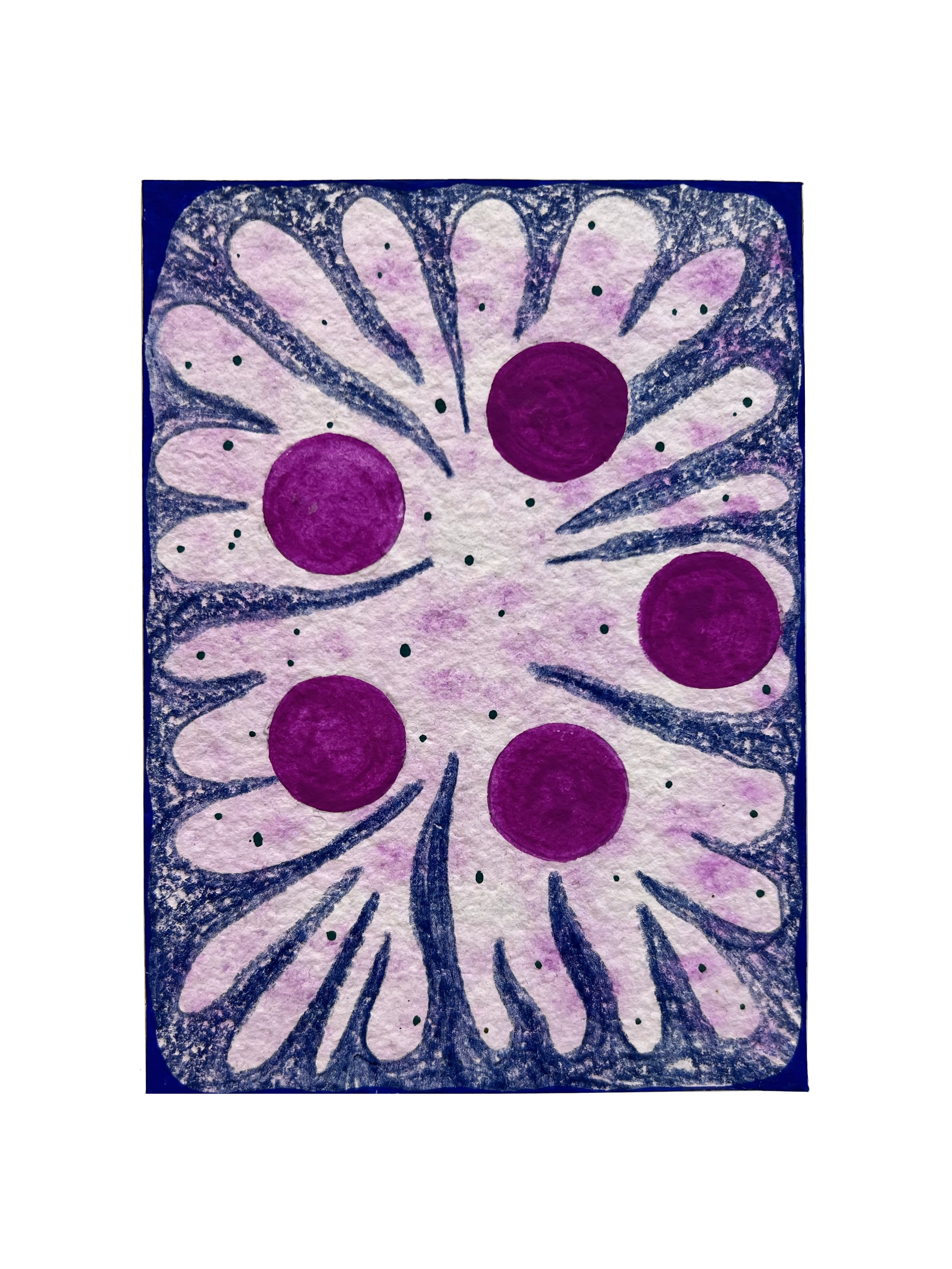
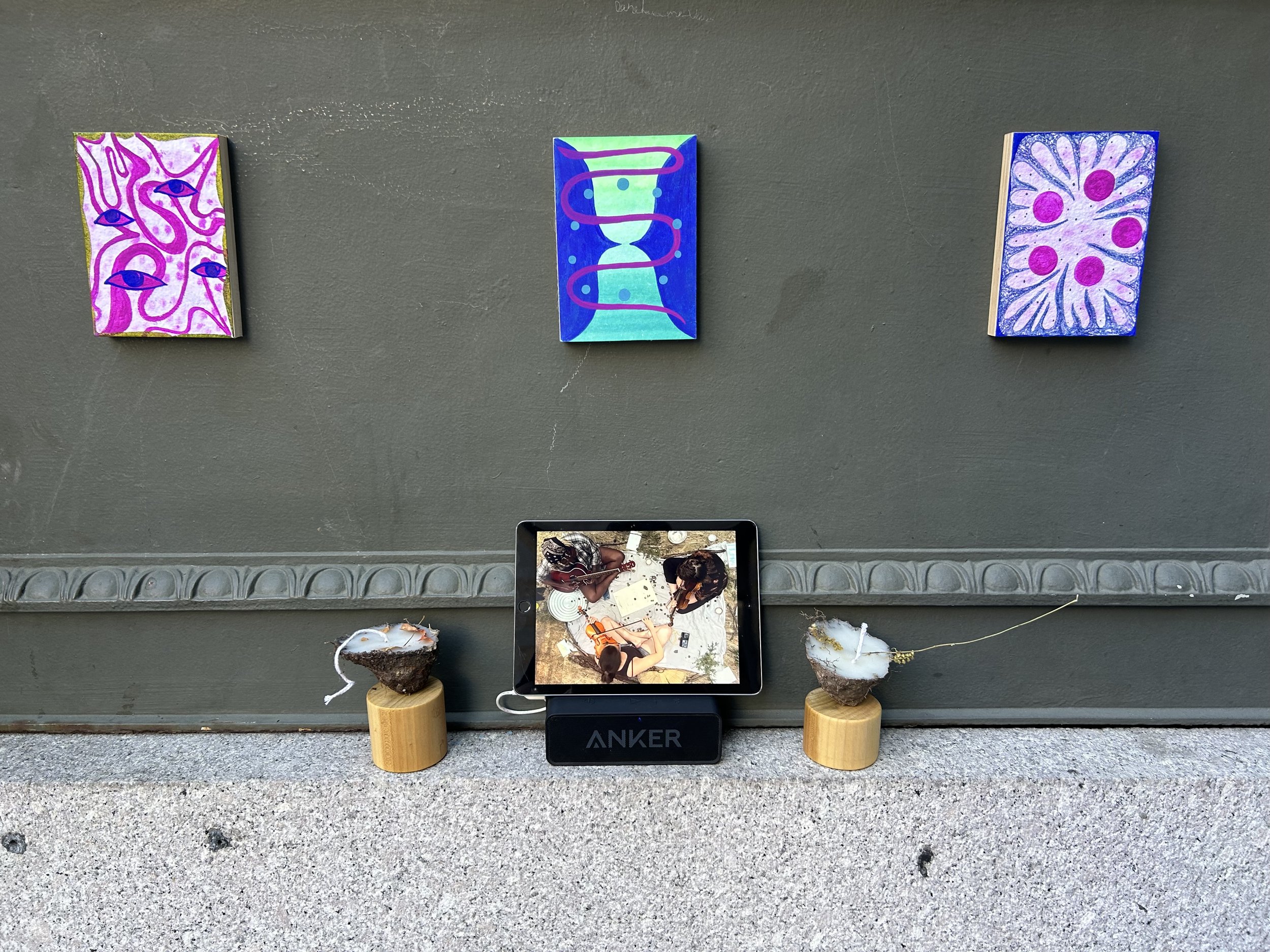
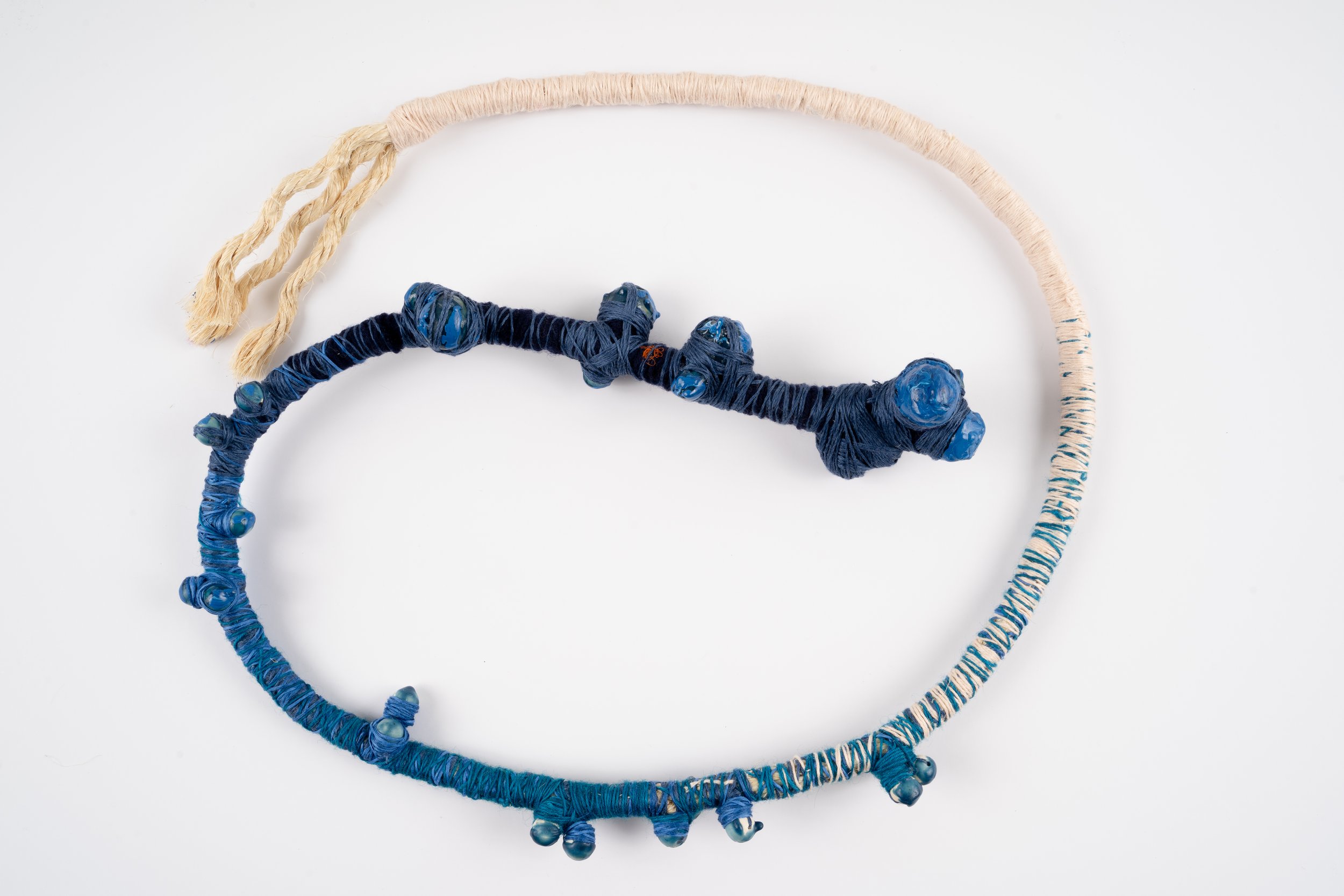
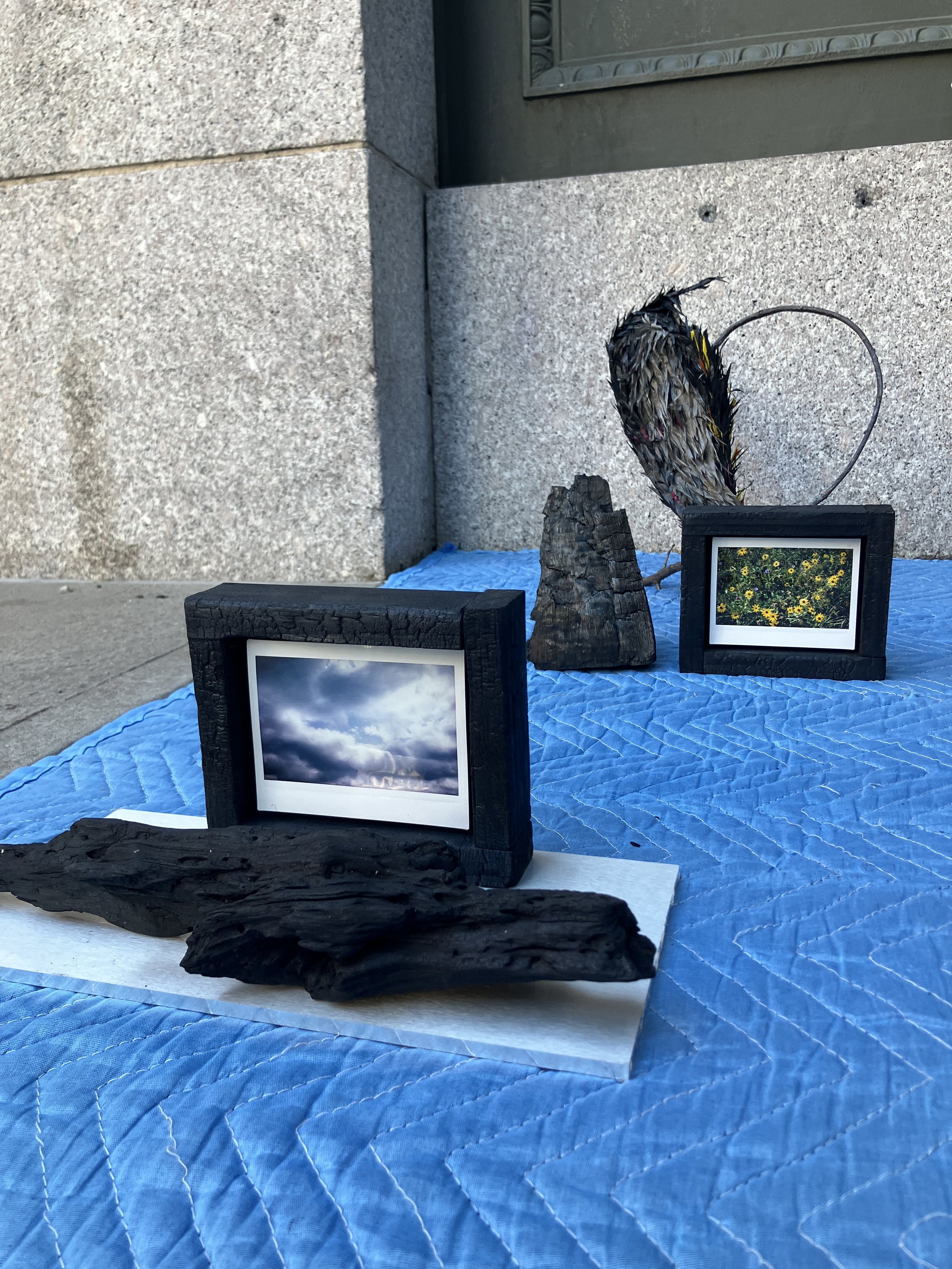
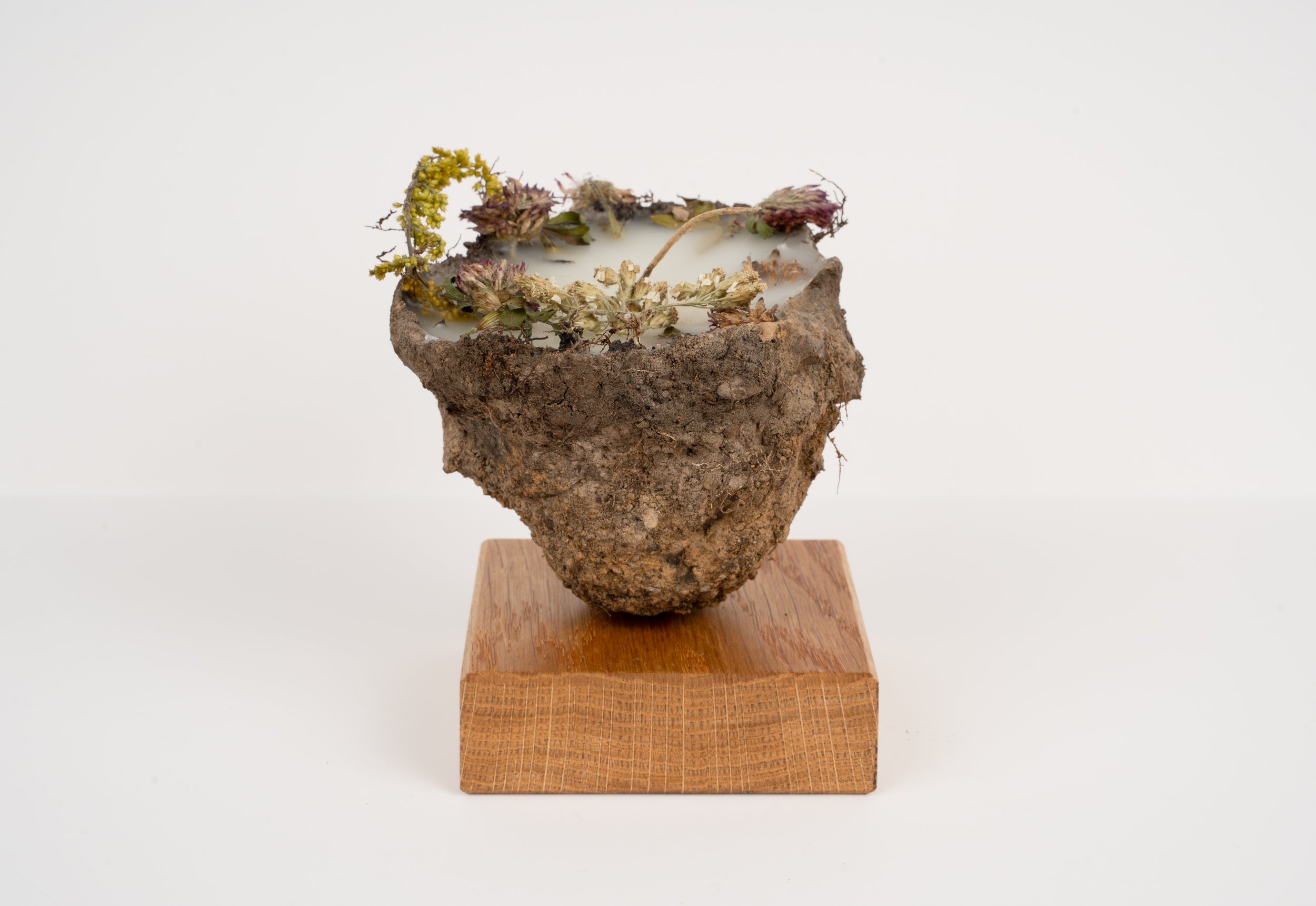
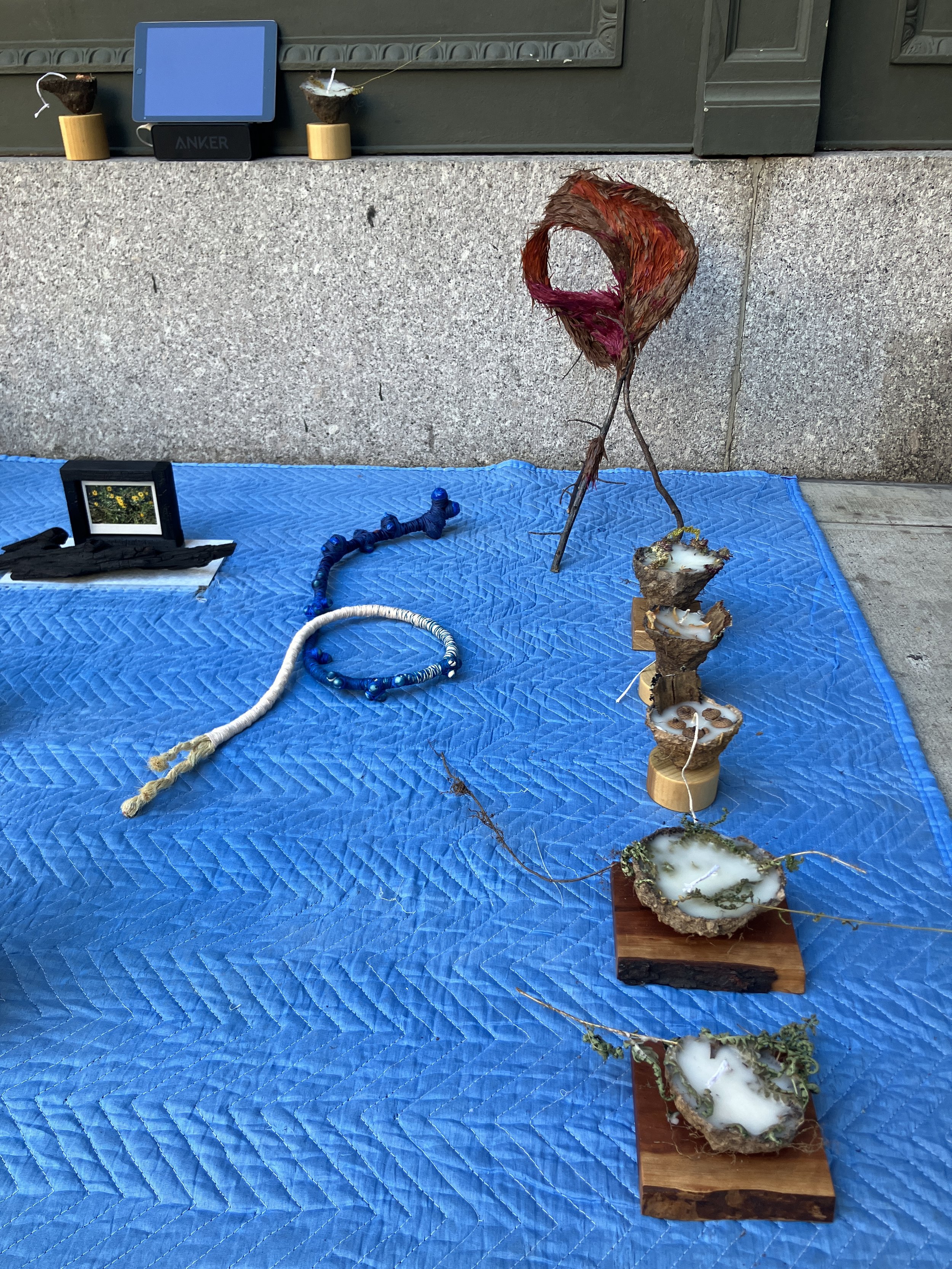
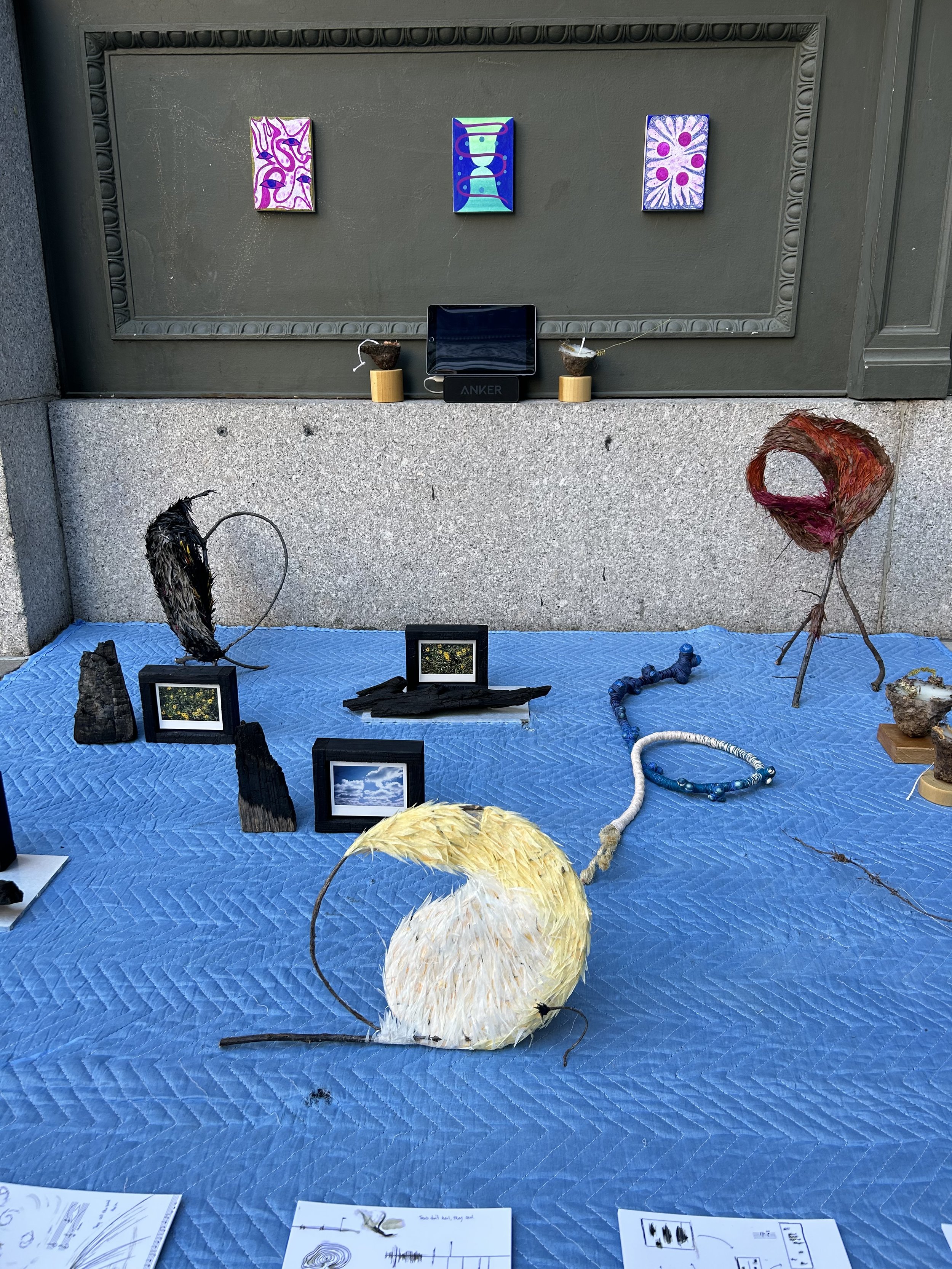
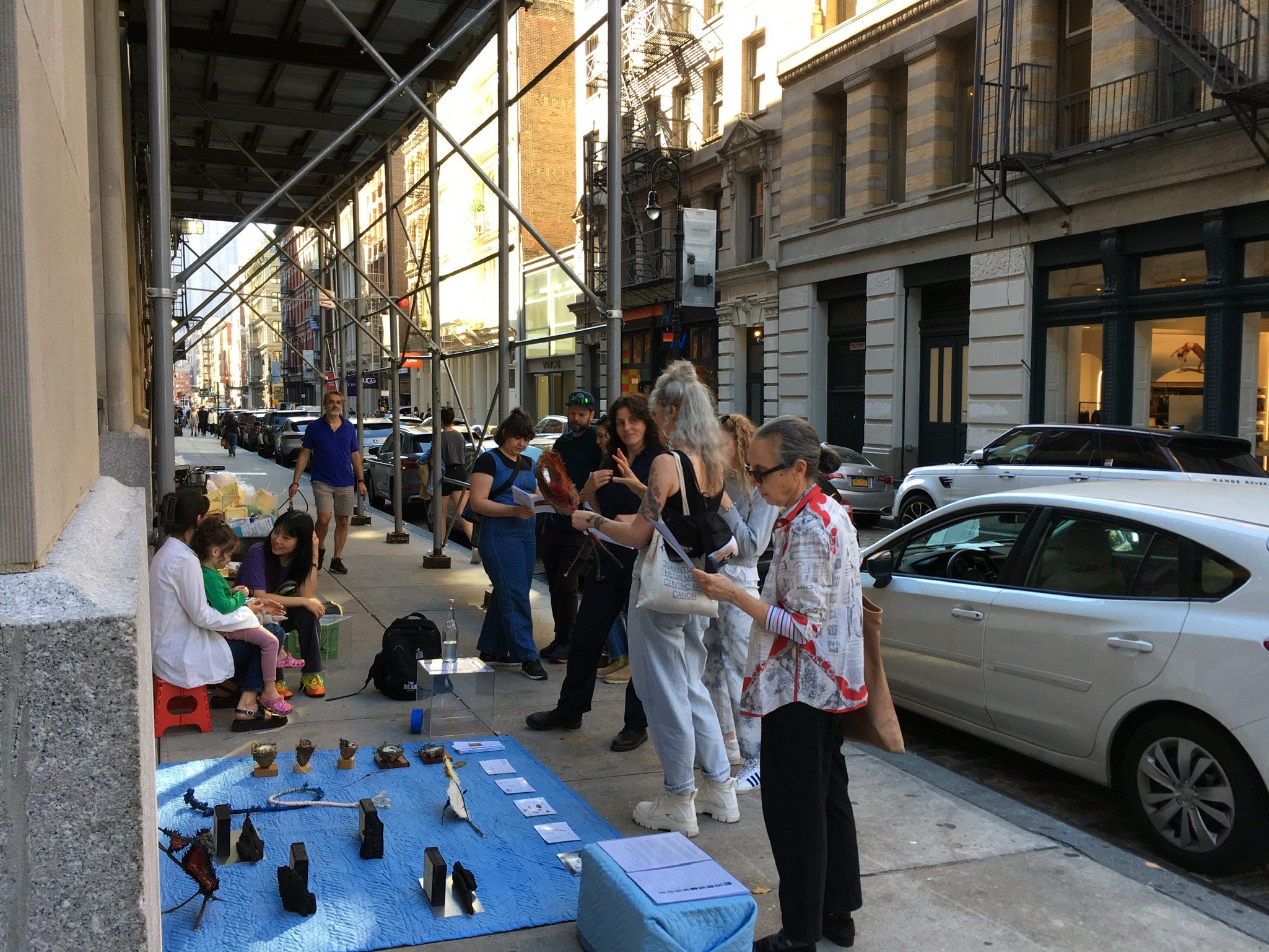
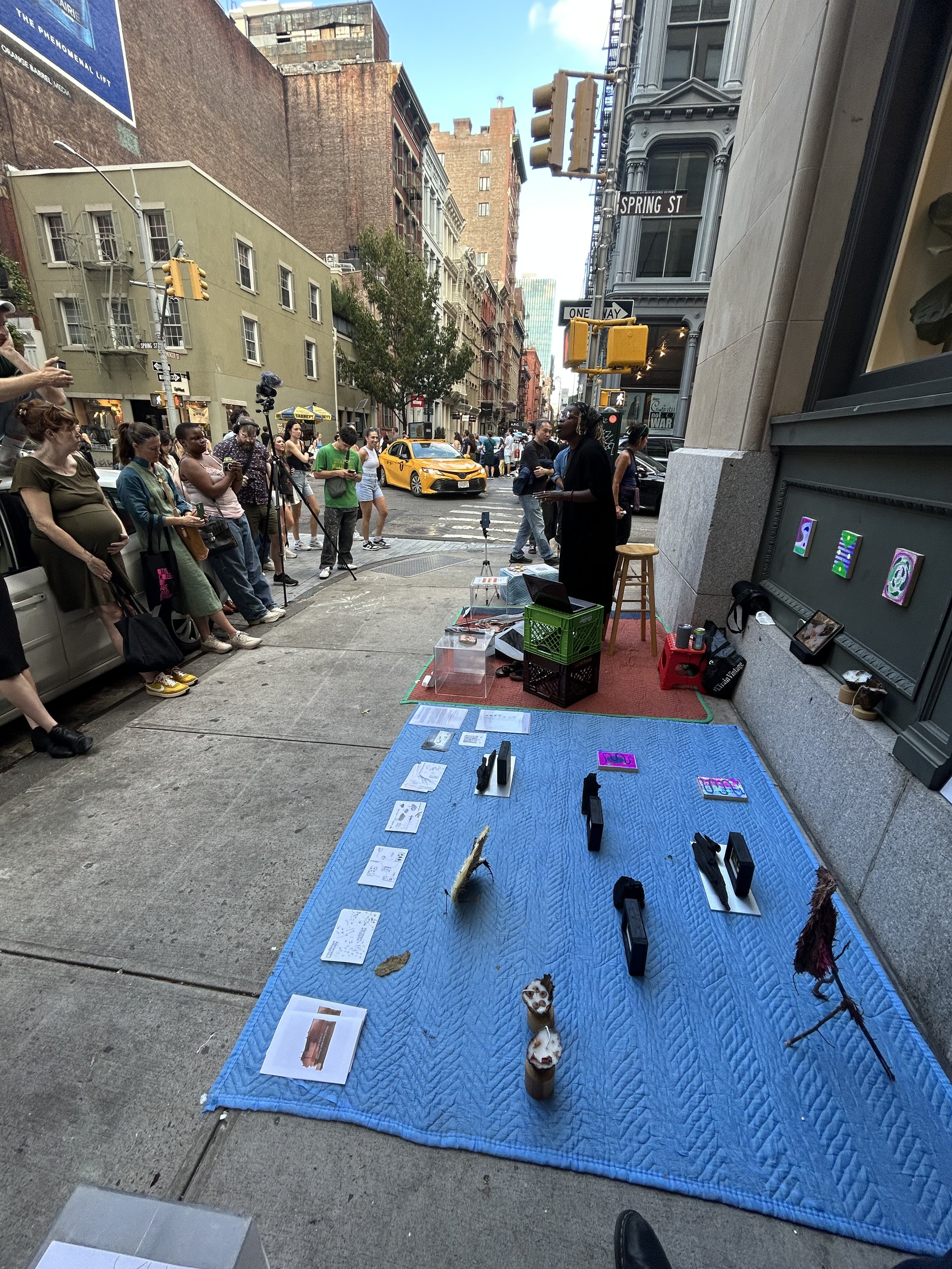
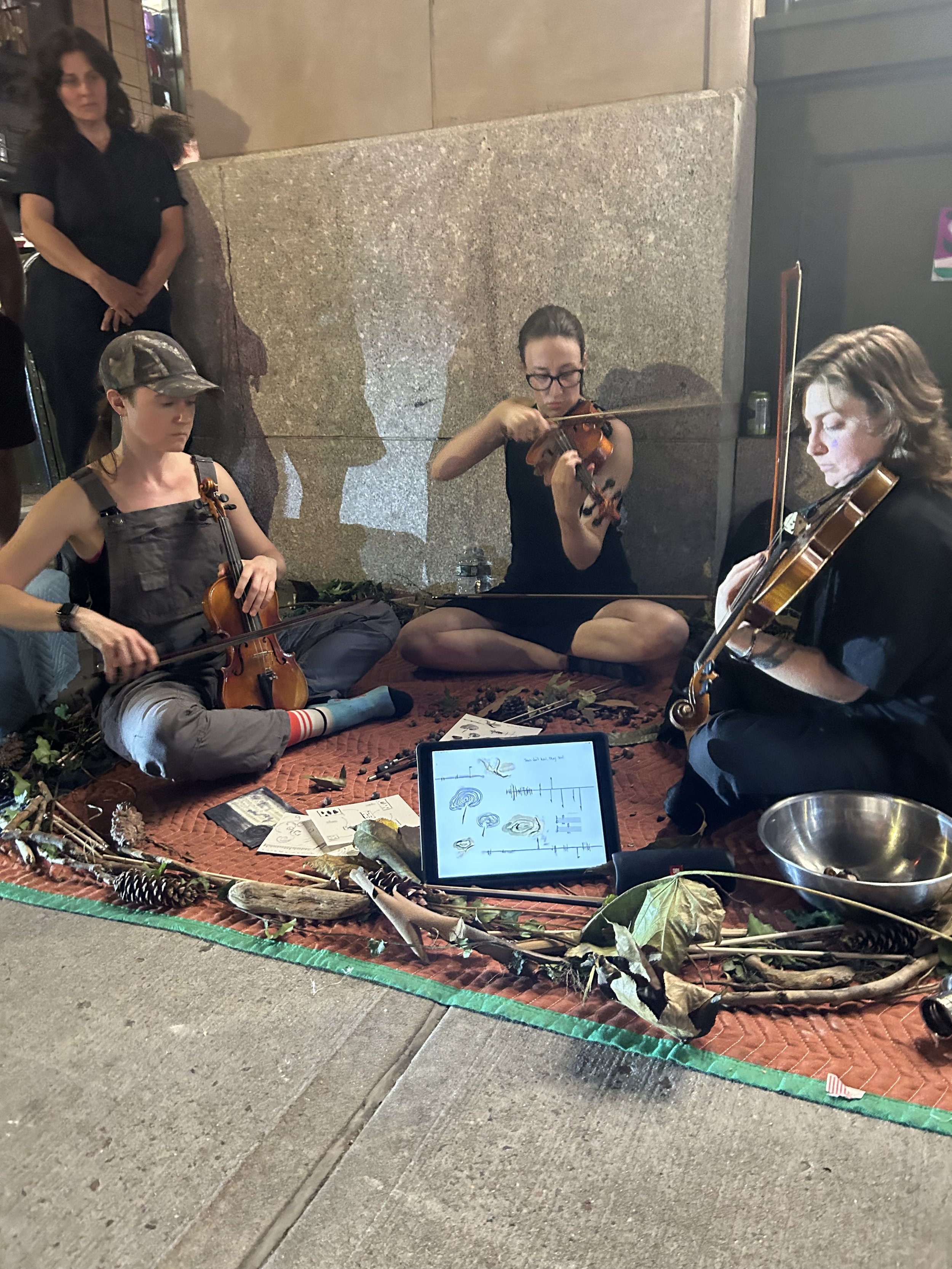
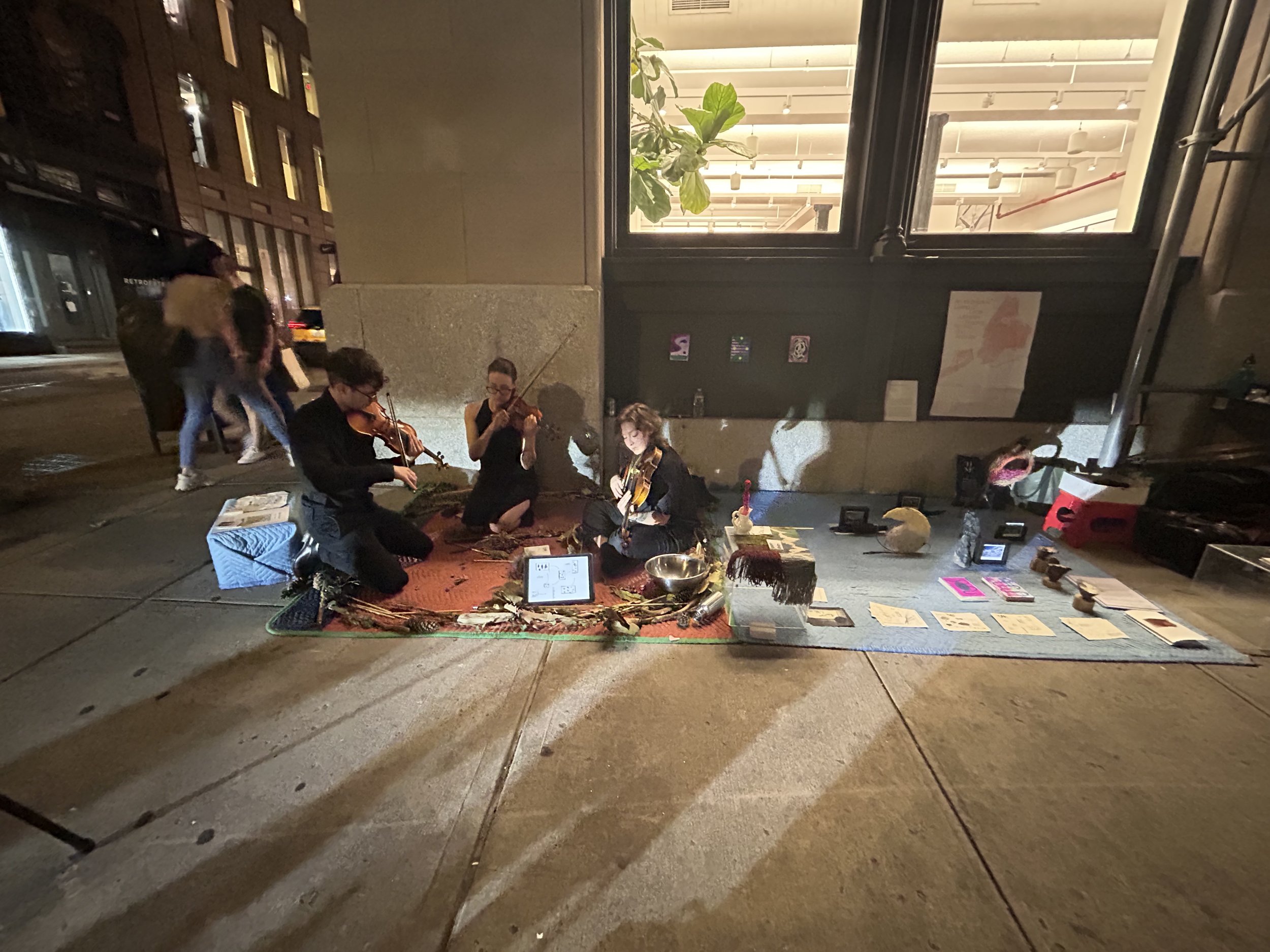
REFLECTIONS
In the process of putting this report together, I realized how seemingly impossible it felt to quantify the true extent and impact of this project. Yes, I was able to determine how much electricity I used based on how many hours I spent on my laptop compiling this report, but what about the environmental impact of the materials used to make the wires that bring that electricity to my home? Or the impact of the trucks that carried the wires here? The factories that made them? While there is surely a mind in the world that can quantify the many tributaries of the impact that using a laptop can cause, it is not mine. So I focused on what this artist's mind can highlight and define as impactful.
Aside from the calculable - the tC02e, the wattage, the gallons - I found the most intangible and incalculable spaces created by this project to have the greatest impact on the environment and participants of this project. It is in these incalculable spaces where artists and musicians thrive, where conversations and imaginations lead to ideas for potential futures, actions, and ideas. These undefinable spaces are where new tributaries are formed, and these tributaries, when flowing with words and thoughts about our environment and our place in it, become more impactful than the 0.48tons of tC02 our cars released transporting us on the way to have these conversations. For this project, these spaces existed during our meals, our ceremonies, and our campfires.
I continue to have conversations with many participants of this project about how their relationship with their environment has changed because of their three immersive days in the woods. I am reminded of this quote from Wendell Berry “People exploit what they have merely concluded to be of value, but they defend what they love, and to defend what we love we need a particularizing language, for we love what we particularly know.” Three days fully immersed in the outdoors allowed seven artists and musicians from a large city to begin developing their particular languages; these beginnings of new language manifested in the group exhibition at P.A.D. and continued in conversation and this report.
A future iteration of this project is already planned for July 2024. Based on what I learned in this report, this future iteration will make moves to reduce calculable impacts. We hope to source all meal ingredients from local farmers in Schoharie Valley and avoid all big box grocery stores, we plan to cut down on travel emissions by encouraging train travel from NYC rather than driving multiple cars to the residency site and we hope to upgrade our solar power systems so that work done in preparation for the residency and putting together the next Climate Impact Report can all be done with solar rather than grid energy.
Conversations around the campfire, during meals and ceremonies will continue to be a major focus of this upcoming project.
Credits and Links
This report was created by the artist Beatrice Modisett, using a template from Artists Commit. Artists Commit CIR Mentor, Deville Cohen offered guidance, structure, and editing support.
Exhibition Link:
P.A.D Exhibition Images
Residency Images

